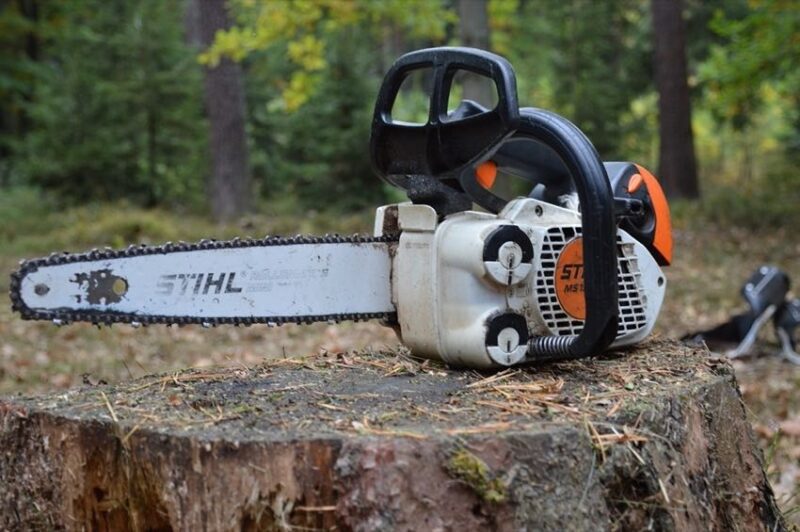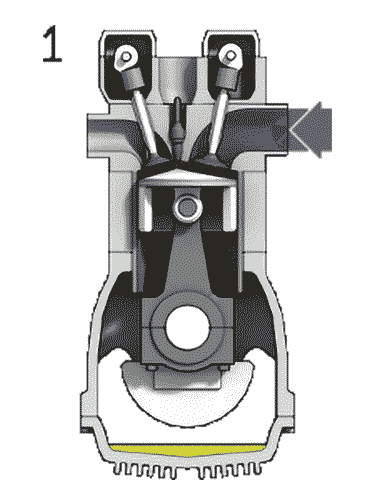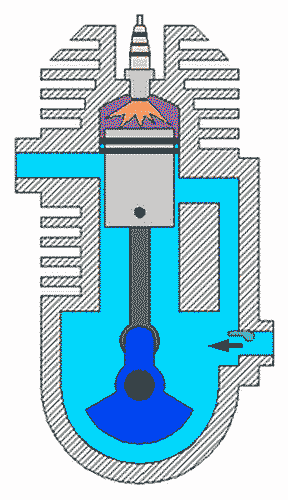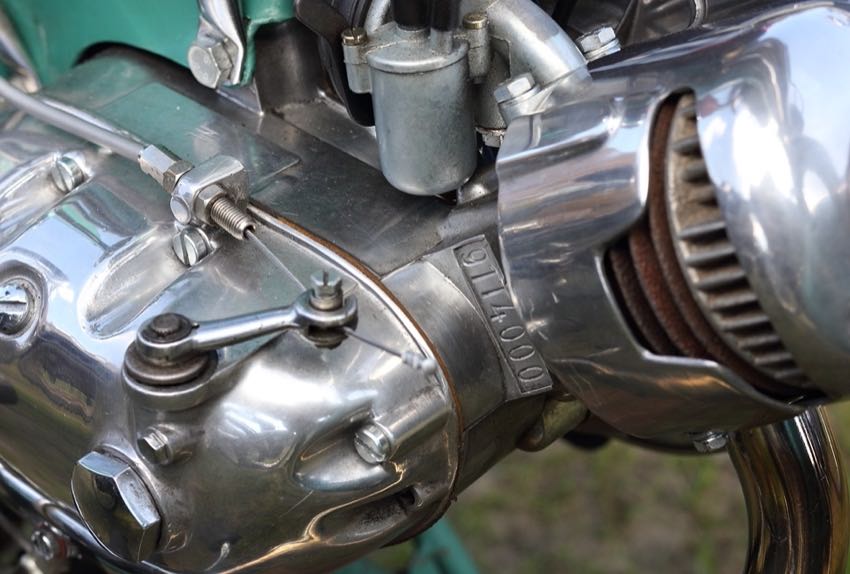With the advent of newer trimmer and lawn products that include 4-cycle engines, we are often asked the question: 2 Cycle vs 4 Cycle Engines – Which is Better?
The issue concerns whether these new 4-cycle OPE tools are better than their 2-cycle counterparts (literally: “Which is better, 2-stroke or 4-stroke?”) The answer may be simpler than you think, but first, it’s important to understand the differences between the two technologies. Each has its strengths, though we wouldn’t consider them fairly matched—at least not for the purposes of portable lawn care products. Check out our review of the Makita EM2650LH 4-stroke string trimmer.
The Basics of 2-Cycle vs 4-Cycle Engines
2-cycle (sometimes referred to as 2-stroke) engines are typically thought of as those motors which accept a pre-mixed gas-oil mixture. This mixture, which can range from 50:1 to 20:1 depending on the motor, both supplies fuel, and lubrication to the motor during operation.
4-cycle (sometimes referred to as 4-stroke) engines are more akin to what you will find in your car. 4-stroke motors also have a crankcase and an oil distribution system that keeps the oil separate from the gas as it lubricates the engine components. Since the oil is separate, it also needs to be periodically changed—typically after every 25 hours of use.

Four cycle engines use the same gas you buy for your vehicle and can contain up to 10% ethanol (you should not use E85 gas as it is not compatible with either 2-cycle or 4-cycle motors commonly found in small lawn trimmers and cutting machines).
How Two-Cycle vs Four-Cycle Engines Work
There is a marked difference between a 2-cycle vs 4-cycle engines operation. A 4-cycle motor works, as you might expect, in four stages. There is the power (down) stroke, the exhaust (up) stroke, the intake (down again) stroke, and the compression (up again) stroke. It takes two full revolutions of the crankshaft to deliver these four strokes. It’s the power stroke that sends the piston through each of the three remaining stages.

A 2-cycle engine literally has just two cycles that combine the above duties. The first stroke is the combined power and exhaust stroke and the second combines the compression and intake stroke. Both power and combustion happen as the piston reaches the top of its stroke. At the bottom, the exhaust and intake occur. It takes just a single revolution to generate two strokes and propel the piston through its full cycle.

More Parts = More to Break
Four-cycle engines have a lot more moving parts. They have a crankshaft, camshaft, connecting rod, valves, lifters, and piston. A two-cycle engine really has only three major moving parts. This includes the crankshaft, connecting rod, and piston. In small-size two-cycle engines, there are no cams, lifters, or valves. As a general rule, fewer parts equals less potential for failure and easier maintenance.
Overall, the 2-cycle engine is typically smaller in displacement and size as compared to 4-cycle which, many times, is almost double the displacement and overall size to achieve the same power. The reason for this is because since the 2-cycle combines two functions in one rotation, it makes the power twice as quickly as a 4-stroke.
Pros and Cons of 2-Cycle vs 4-Cycle Engines
From the description so far you might think that 2-cycle has complete domination over 4-cycle… Well in small marine applications and home lawn care it probably does. Comparing 2-cycle vs 4-cycle engines take a bit more work, however. The fact is, 4-cycle only has a few advantages: greater potential torque, higher fuel economy, and better emissions. With that said, let’s look at a list of pros and cons for both 2-cycle and 4-cycle and lay out the case for each:
| 2-cycle | 4-cycle | |
|---|---|---|
| Parts | ADVANTAGE | More moving parts |
| Maintenance | ADVANTAGE | Must change oil |
| Storage | ADVANTAGE | Must keep level |
| Vibration | ADVANTAGE | Higher vibration |
| Fuel Economy | Less efficient | ADVANTAGE |
| Emissions | Burns oil | ADVANTAGE |
| Torque | Less potential | ADVANTAGE |
| Starting | ADVANTAGE | Much harder to start |
| Weight | ADVANTAGE | More parts = more weight |
Comparing 2-Stroke vs 4-Stroke
As you can see there are definitely a couple of advantages to owning a 4-cycle motor for a trimmer or other lawn care application, but for the most part, there is a reason 2-cycle motors are currently king. They are simply reliable, have less to break, and are much easier to start and use. For high torque considerations, 4-cycle may indeed be the way to go, but generally, we recommend sticking with the tried and true 2-cycle models – the pros do!
The bad news is, that the current environmentalist focus seems to drive many municipal decisions right now. In the near future, stricter emissions rules may eventually phase out 2-cycle engines entirely. When this happens, we hope manufacturers can improve 4-cycle technology and deliver products that perform as conveniently and easily as their 2-cycle counterparts.




Two stroke engines are better because they can be ran sideways to cut tight crevices. Four stroke engines would be starved of oil during this maneuver.
I have owned both 2 and 4 cycle trimmers. I found the 4 cycle engines bulkier, heavier, and required more maintenance and also they did not have any longer life before failure and were not cost effective to repair. I decided to go back to 2 cycle for less maintenance and less weight. I never found the 4 cycles much easier to start they especially had problems after a couple seasons as valves develop carbon and began to see more blow by. I think 4 cycle engines tend to have issues because they are more sensitive to heat build up.
There is no way I will ever buy another 2 cycle weed eater. The 4 cycle will start in 2 pulls PERIOD. I am 64 years old and have trashed many 2 cycle trimmers due to poor performance. One must make sure the mixture is PERFECT and still no guarantee it will start quickly.Only trouble with my 4 cycle Troybilt is I forgot to drain the gas and had to rebuild the carb.
Environmental mania in government? Why is it so hard to simply consider OUR health and our children future in all process and endeavors that impact the world we living in? Plus when you rant about government you are either ranting about the will of the people or officials who answer to lobbying and the wealthy. I doubt issues of protecting people or the environment fall into the later. Only people that need to rant about enviro,metal mania (aka common sense) are those shareholders or business related pros who profit is reduced by a small increase in cost for being sensible… Read more »
I have a question regarding 2-cycle fuel. If a different web blog is better suited for this question maybe someone could point me in the right direction. The following involves 2 (two!) mistakes I made due to not having my brain fully in gear. (This will likely cause a laugh or two.) All volumes are approximate. Mistake #1: Without realizing what I was doing I added approximately 1 quart of pure gasoline (no ethanol) to approximately 1 gallon of 2-cycle fuel mixed at 50:1 ratio with 2-cycle oil, and again with pure gasoline. Mistake #2: After realizing Mistake #1 (again… Read more »